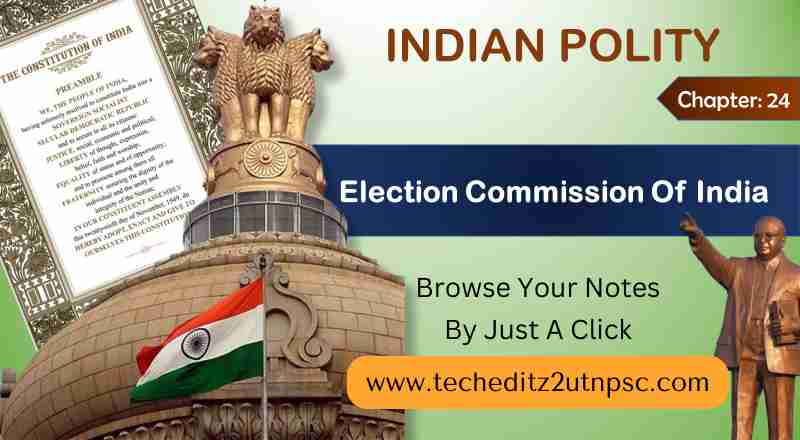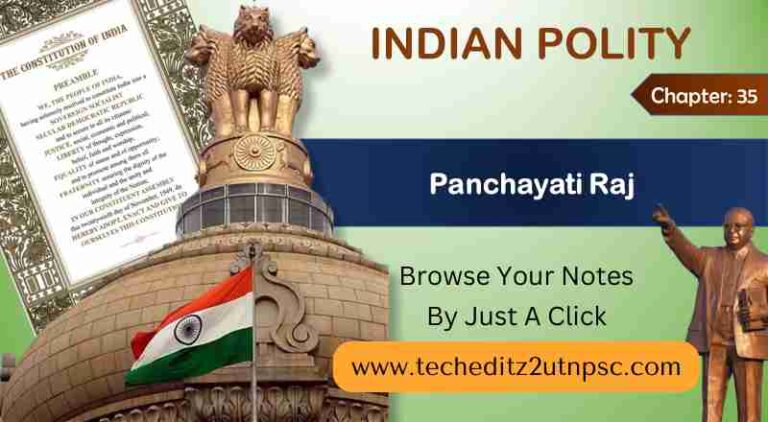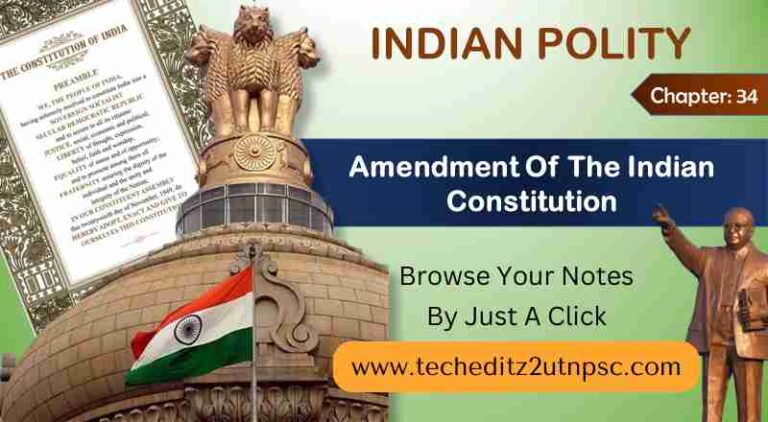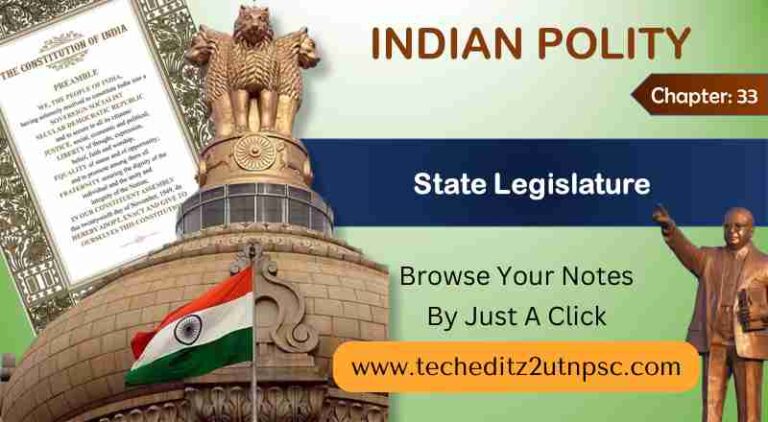support@techeditz2utnpsc.com | 8300-921-521

Election Commission Of India
Indian Polity
Chapter 24: Election Commission Of India
Election Commission Of India:
- The Election commission is a constitutional body that is entrusted with the responsibility of conducting free and fair elections in the country.
- On October 16, 1989 for the first time the President appointed 2 election commissioners.
- The two election commissioners were appointed to cope with increased work of the election commission on the account of lowering the voting age from 21 to 18.
- This was done through 61st amendment act of 1988 and came into force in 1989.
- In October 1993 the President (Dr Shankar Dayal Sharma) appointed two more election commissioners. Since then the election commission is a multi member body.
- Present CEC (June 11, 2012-till date) – V S Sampath
- H S Brahma and Syed Nasim Ahmed Zaidi are the election Commissioners.
The Election Commission Conducts The Election For
- The President
- The Vice President
- The Lok Sabha
- The Rajya Sabha
- The State Legislative Assemblies
- The State Legislative Councils
- Article 324: It provides the power of superintendence, direction and control of elections to the Parliament, state legislatures, the office of the President of India and the Vice president of India.
- Panchayats and Municipalities elections are conducted by the respective State Election Commissions.
Composition Of Election Commission:
- There is a Chief Election Commissioner.
- There are some other members called election commissioners.
- The President decides the strength from time to time. Appointment:
- The Chief Election Commissioner and other Election Commissioners are appointed by the President of India.
Qualifications:
- The qualifications of the members of the election commission are not prescribed in the constitution.
Term Or Tenure:
- The term and other conditions are decided by the President after a law is passed by the Parliament to that effect.
Chairman Of Election Commission:
ADVERTISEMENT
- The Chief Election Commissioner acts as the Chairman of the Commission when any other election commissioner is appointed.
Salary:
- The salary is decided by the Parliament.
Resignation:
- The Chief Election Commissioner and other Election Commissioners submit the resignation letter to the President.
Removal Of Chief Election Commissioner:
- The Chief Election Commissioner is removed in the same manner like that of a judge of Supreme Court.
Removal Of Other Election Commissioners:
- Other Election Commissioners are removed by the President only on the recommendation of the Chief Election Commissioner.
- But, the advice of the Chief Election Commissioner is not binding on the President.
Functions Of Election Commission:
- The election commission prepares and revises the electoral rolls (voters List).
- The election Commission will notify the dates and schedules the elections.
- The election commission scrutinizes the nomination papers.
- The election commission recognizes the political parties.
- The election commission allots the election symbols to the political parties and also to the independent candidates.
- The election commission determines the code of conduct to be observed by the parties and the candidates at the time of elections.
- The election commission advices the President in the matter relating to the disqualification of the members of Parliament. (Lok Sabha and Rajya Sabha).
- The election commission advices the Governor of a state in the matter relating to the disqualification of the members of state Legislature.
- The Election Commission recognizes the political parties as National party or Regional (state) party.
Miscellaneous:
ADVERTISEMENT
- The Chief Electoral Officer is appointed by the Chief Election Commissioner in consultation with the state government.
- At the district level the district Collector acts as the returning officer. The first general election held in 1951 – 52 cost the exchequer Rs. 10.45 crore.
- The election expenditure for the elections that was held in 2009 was Rs. 1400 crore.
- The estimated expenditure for the 15th Lok Sabha elections to be conducted in 2014 is Rs. 3500/- crore.
- This does not include the expenses incurred for security and the amounts the political parties spend.
- For every constituency there is a returning officer appointed by the district collector.
- The Collector also appoints presiding officer for every polling booth.
- In January 2012 the Election Commission ordered draping of Mayawati Statues and her party symbol elephant in Uttar Pradesh.
- In the year 2004 prior to Lok Sabha elections the Election Commission ordered to drape photographs of the then Prime Minister and BJP leader Atal Bihari Vajpayee installed on highways and at Golden Quadrilateral road projects.
- In the year 2011 the Election Commission on a complaint received to freeze the elephant symbol of BSP (Bahujan Samajwadi Party) said that this question could be considered only if the model code of conduct was violated.
- Every October the EC begins its annual exercise of revising the electoral rolls with the following January 1st as the effective date.
- This is of 2 types summary revision and electoral revision. In the summary revision responsibility is cast on the potential voter to get himself registered by going to the designated center.
- In electoral revision door to door verification is undertaken by the officers
- The EPIC (Electoral Photo Identity Card) is valid even the elector shifts to a different assembly constituency.
- The reason is the card is primarily to identify the voter and can be used in any polling station in India to which the elector has moved. (infact it shows the previous address and is still valid – N Gopalaswami former CEC – article in The Hindu on December 14, 2012).
- If the system is integrated with UID then the number can remain same even if s/he moves from one place to the other.
- The law is very clear even today for voting physical presence is mandatory.
- If e-KYC can affect cash transfer why not vote transfer. If this is adopted this is a boon not just to migrants and also to armed forces personnel, para military forces and police. For this Aadhar number has to be incorporated in the electoral roll.
- In 2011 the EC disqualified Umlesh Yadav then sitting MLA from Bisauli in UP for a period of 3 years for failing to provide a true and correct account of her election expenses.
- She had skipped any mention of her spending on advertisements dressed up news during her 2007 poll campaign.
- She was the first legislator ever to bite the dust on grounds of expenditure (and paid news).
- Dr Mishra the Cabinet Minister in MP now (2013) faces charges of the kind.
- The Press Council of India definition for ‘Paid News’ is – any news or analysis appearing in any media (print or electronic) for a price in cash or kind as consideration. According to the committee constituted by the PCI during the 2012 elections in Gujarat the paid news was rampant.
- The CEC on January 11, 2013 sought immediate implementation of proposed electoral reforms relating to the criminalization of politics, particularly banning candidates with criminal background from contesting polls.
- The proposal sent by the EC on July 15, 1998 is still pending with the government.
Visit Our YouTube Channel For More Free Videos: Click Here


